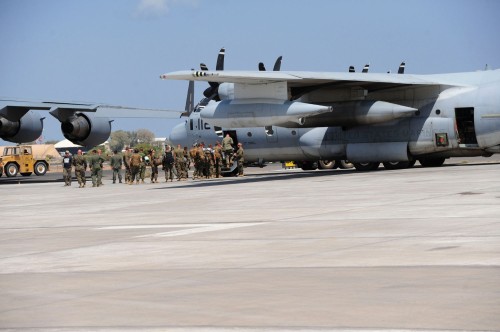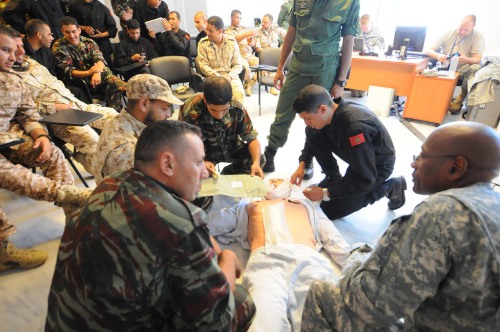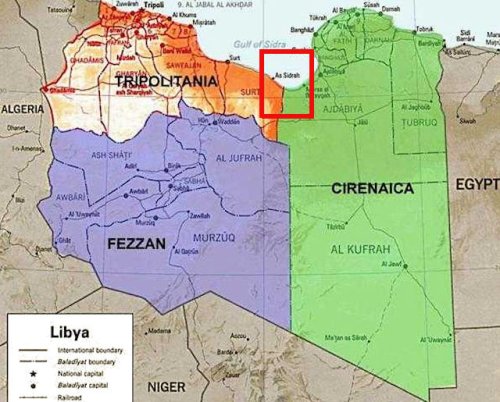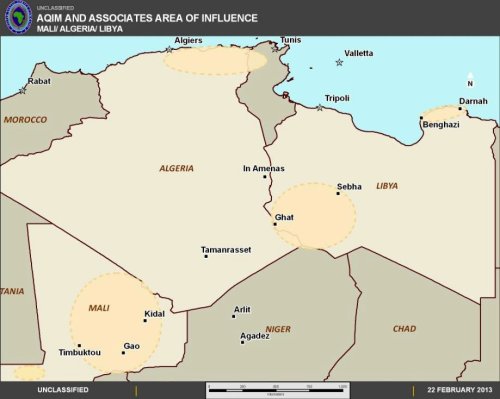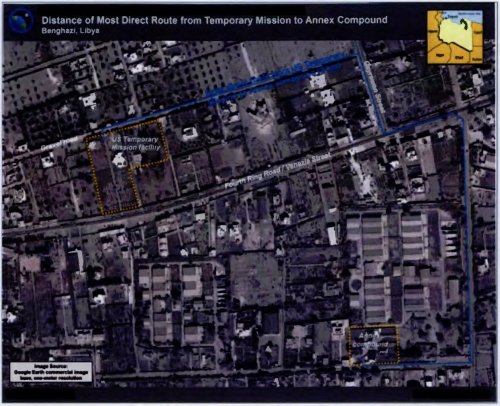Over the weekend, the United States decided to close out their embassy in Tripoli, Libya. The remaining personnel were then taken by truck convoy overland to Tunisia. The Pentagon helped escort the vehicles on their five hour journey. I wrote a short piece on the operation for War is Boring as details were still unfolding, but most of the informed speculation turned out to be correct.
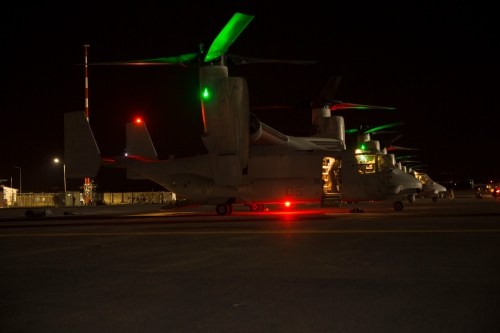
MV-22B Ospreys from Special Purpose Marine Air Ground Task Force – Crisis Response sit on the ramp at Naval Air Station Sigonella, Italy as Task Force Tripoli prepares to depart for a Non-Combatant Evacuation Operation in the early hours of 26 July 2014.
The force for this Non-Combatant Evacuation Operation (NEO) consisted of an airborne quick reaction force provided by Special Purpose Marine Air Ground Task Force – Crisis Response (SPMAGTF-CR), three F-16 fighters, and an unspecified number of intelligence, surveillance, and reconnaissance (ISR) assets.
The SPMAGTF-CR contingent, reportedly called Task Force Tripoli, consisted of twenty-four troops in two MV-22B Osprey tilt-rotors, supported by KC-130J Hercules tankers. This task force should not be confused with the Marine task force that took part in the initial stages of Operation Iraqi Freedom in 2003. Back in May, the Marines had been forward deployed to Naval Air Station Sigonella in Italy for just this sort of contingency. SPMAGTF-CR was created in the aftermath of the attack on the US consulate in Benghazi, Libya in September 2012 for exactly these sort of operations. The Marines shadowed the convoy in order to respond to any attacks. Some eighty additional armed Marines were in the vehicles as part of the embassy contingent, which totaled over one hundred and fifty people. The Marines were likely Embassy Security Guards and members of Fleet Antiterrorism Security Teams (FAST).
Less information is available on the F-16s and ISR assets. The F-16s reportedly flew from Aviano Air Base in Italy. The aircraft were likely from one of the squadrons of the 31st Fighter Wing based there. The jets also received support from KC-135R tankers, no doubt also operating from USAF bases in Europe. An unspecified number of unmanned aerial vehicles – which could include the MQ-1 Predator, MQ-9 Reaper, or RQ-4 Global Hawk – also kept an eye over the entire operation. The USAF has unmanned ISR platforms based in Europe and in neighboring Niger. There has also been an eyewitness image of a Navy EP-3E spy plane, likely from US Sixth Fleet, flying over Tripoli during the operation.
The Department of State has described the evacuation as a “temporary staff relocation” and said repeatedly that it hopes to return to Libya at the earliest possible convenience. However, the embassy in Tripoli had already been working with a reduced staff after the 2012 Benghazi incident. Libya has been wracked by violence since the ouster of Muammar Gaddafi in 2011, with the central government exercising little, if any control over a plethora of militias. Islamist terrorist groups have also taken advantage of the instability in the country.
Recently, militia infighting forced the closure of Tripoli’s airport and destroyed almost a dozen planes on the tarmac. This skirmish no doubt influenced the decision to close the diplomatic mission. Separately, militias allied with General Khalifa Hifter have essentially laid siege to Benghazi in hopes of routing Ansar al-Sharia, a terrorist group linked to Al Qaeda in the Islamic Maghreb (AQIM). There is no clear end to the violence in sight.

